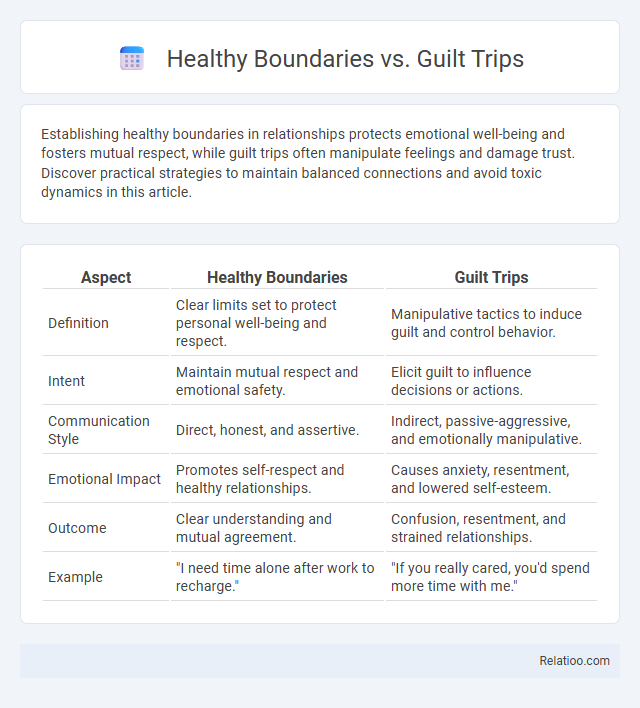Establishing healthy boundaries in relationships protects emotional well-being and fosters mutual respect, while guilt trips often manipulate feelings and damage trust. Discover practical strategies to maintain balanced connections and avoid toxic dynamics in this article.
Table of Comparison
| Aspect | Healthy Boundaries | Guilt Trips |
|---|---|---|
| Definition | Clear limits set to protect personal well-being and respect. | Manipulative tactics to induce guilt and control behavior. |
| Intent | Maintain mutual respect and emotional safety. | Elicit guilt to influence decisions or actions. |
| Communication Style | Direct, honest, and assertive. | Indirect, passive-aggressive, and emotionally manipulative. |
| Emotional Impact | Promotes self-respect and healthy relationships. | Causes anxiety, resentment, and lowered self-esteem. |
| Outcome | Clear understanding and mutual agreement. | Confusion, resentment, and strained relationships. |
| Example | "I need time alone after work to recharge." | "If you really cared, you'd spend more time with me." |
Understanding Healthy Boundaries
Understanding healthy boundaries involves recognizing your limits and communicating them clearly to protect your emotional well-being without causing harm to others. You can differentiate healthy boundaries from guilt trips by identifying when feelings of guilt are artificially imposed to manipulate your decisions or actions. Establishing healthy boundaries fosters self-respect and mutual respect in relationships, preventing guilt from becoming a tool for control or emotional burden.
Recognizing Guilt Trips in Relationships
Recognizing guilt trips in relationships involves identifying manipulative behaviors where one partner uses guilt to control or influence the other's decisions, often blurring the line between healthy boundaries and emotional coercion. Healthy boundaries promote mutual respect and personal autonomy without inducing shame, whereas guilt trips can trigger unnecessary feelings of responsibility for the other person's emotions. Understanding these distinctions is crucial for maintaining emotional well-being and fostering balanced, respectful interactions.
The Psychology Behind Guilt Manipulation
The psychology behind guilt manipulation reveals how unhealthy boundaries are exploited to induce guilt, prompting compliance or control. Individuals using guilt trips often blur the line between legitimate emotional expression and coercive tactics, leveraging feelings of responsibility to undermine autonomy. Understanding the distinction between maintaining healthy boundaries and succumbing to guilt manipulation is crucial for psychological resilience and emotional well-being.
Signs You Need Stronger Boundaries
Recognizing signs you need stronger boundaries includes feeling drained or resentful after interactions, difficulty saying no, and experiencing guilt for prioritizing your own needs. Healthy boundaries protect your emotional well-being and prevent manipulation from guilt trips, which often exploit your sense of responsibility to control behavior. Strengthening your boundaries helps you maintain balance and respect in relationships without the burden of unwarranted guilt.
How Guilt Trips Undermine Your Well-being
Guilt trips manipulate emotions to provoke discomfort and compliance, eroding mental health by inducing chronic stress and self-doubt. Healthy boundaries protect emotional well-being by fostering respect and clarity, whereas guilt trips create confusion and undermine self-esteem. Recognizing and resisting guilt-trip tactics strengthens personal autonomy and supports psychological resilience.
Strategies for Setting Healthy Boundaries
Setting healthy boundaries involves clearly communicating personal limits and expectations while respecting others' needs, which reduces the likelihood of feeling manipulated by guilt trips. Effective strategies include asserting yourself calmly and consistently, recognizing emotional manipulation tactics, and practicing self-compassion to resist internalized guilt. Prioritizing open dialogue and mutual respect helps maintain balanced relationships without succumbing to unhealthy emotional pressures.
Responding to Guilt Trips Assertively
Responding to guilt trips assertively involves recognizing manipulative tactics and setting clear, respectful boundaries to protect emotional well-being. Using "I" statements communicates feelings without blame, reinforcing personal limits while maintaining respectful dialogue. Consistent assertiveness reduces the power of guilt trips and promotes healthier interpersonal dynamics rooted in mutual respect.
Benefits of Maintaining Clear Boundaries
Maintaining clear boundaries protects your emotional well-being by preventing guilt trips and reducing feelings of guilt, promoting healthier relationships built on mutual respect. Clear boundaries empower you to communicate your limits effectively, leading to increased self-esteem and decreased stress. This practice ensures that your needs are prioritized without manipulation, fostering genuine connections and personal growth.
Overcoming the Fear of Disapproval
Healthy boundaries empower you to protect your emotional well-being without succumbing to guilt trips or unhealthy guilt. Recognizing that fear of disapproval often fuels guilt allows you to assert your needs confidently and reduce anxiety about others' judgments. Overcoming this fear strengthens your relationships by promoting honest communication and mutual respect.
Empowering Yourself Through Self-Respect
Establishing healthy boundaries reinforces self-respect by clearly defining personal limits and communicating needs without manipulation. Recognizing guilt trips helps prevent emotional exploitation, allowing you to maintain autonomy and prioritize your well-being. Empowering yourself involves distinguishing between genuine responsibility and imposed guilt, fostering resilience and mental clarity.

Infographic: Healthy Boundaries vs Guilt Trips
 relatioo.com
relatioo.com